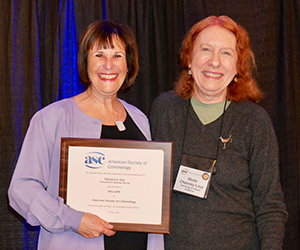
The American Society of Criminology (ASC) has elected Vice Provost and Graduate Dean and sociology Professor Marjorie Zatz as an ASC Fellow — the society’s highest honor — in recognition of her outstanding contributions to the field of criminology.
The society celebrated Zatz’s achievements during an award ceremony at its meeting earlier this month in San Francisco.
This is Zatz’s sixth award from ASC. She is also the recipient of the Herbert Block Award; the Division on Women and Crime’s Senior Scholar Award; the Division on People of Color and Crime’s Lifetime Achievement Award; the Coramae Richey Mann Award for Outstanding Scholarship; and the Julius Debro Award.
She was named one of the Top 35 Women in Higher Education by Diverse: Issues in Higher Education in 2019. In addition, her research contributions have been recognized by the Western Society of Criminology with its Award for Outstanding Contributions to Criminology.

Zatz has published seven books and more than 50 articles and chapters on immigration policy; race, gender and juvenile and criminal court processing; Chicano gangs; and the Cuban and Nicaraguan legal systems.
She is the recipient of grants from the National Science Foundation, the Andrew W. Mellon Foundation, the Henry Luce Foundation, the Hearst Foundations and the Council of Graduate Schools, among others.
Before moving to UC Merced in 2014, she was professor of justice studies at Arizona State University for 32 years. She held several administrative positions at ASU and served as program director for the Law and Social Sciences Program at the National Science Foundation.
The title of fellow is given to ASC members who have achieved distinction in criminology and recognizes individuals who have made a scholarly contribution to the intellectual life of the discipline, whether in the form of a singular, major piece of scholarship or cumulative scholarly contributions. Longevity alone is not enough; a fellow must have made a significant contribution to the field through the career development of other criminologists and/or through organizational activities within the society.
Brenda Ortiz

Senior Public Information Representative
Office: (209) 228-4203
Mobile: (209) 628-8263






